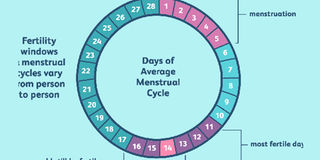Menstrual irregularities should worry you

Experts advise women to keep a record of their menstrual. Journal your start date every month for six months in a row to identify irregularities.
PHOTOs/net
What you need to know:
Tracking your menstrual cycle helps to understand normalcy, the time for ovulation and identify important changes
Have you ever cared to count and keep track of your menstrual cycle? While menstrual cycle irregularities may not be serious, they could be signals to health problems.
Tracking your menstrual cycle helps to understand normalcy, the time for ovulation and identify important changes. A menstrual cycle is the time between the first day of bleeding and the next period. And this is not the same for every woman.
During adolescence, the cycles are usually longer, but they tend to shorten with age. A regular or normal cycle is one that occurs every 21 to 35 days and lasts two to seven days.
The cycle, according to Dr Joseph Nsengiyumva, a gynaecologist at Bethany Women’s Hospital in Luzira, is a repeated sequence of biological changes that occur in the uterus of human females.
He says, “The cycle and its timing are controlled by normal hormonal changes that occur in the ovary and the uterus. The menstruation cycle occurs in the innermost uterine lining (endometrial lining) which results in shading, following failure of implantation or fertilisation.”
Adolescent girls have their first cycle by 12 years, although in some it can be as early as eight years or as late as 16. If a girl turns 16 years without their periods, Dr Nsengiyumva recommends a pelvic examination by a gynaecologist. The cycle stops at 45 to 52 years (menopause).
Cramping
During the menstrual cycle, hormones cause mood swings, many women suffer from cramping due to hormones, which cause the womb to actively shed the lining that was built up in the previous menstrual cycle.
Dr Nsengiyumva says after ovulation, the amount of oestrogen in the body increases to ensure that the lining of the womb is thickening with nutrients and blood. In case fertilisation occurs, the fertilised egg will have enough nutrients to support its growth. This phase is usually a fortnight long counting on the first day of bleeding and it is noticeable by a thin, slippery cloudy white discharge.
“Once the ovum is released, it moves along the fallopian tube towards the uterus and can stay viable for two days. These are the most fertile days when a woman is more likely to become pregnant,” he adds.
After ovulating, the dominant follicle starts producing progesterone, which causes further preparation of the womb for fertilisation. Dr Nsenguyumva adds that, “The empty follicle that released the ovum starts to shrink and produce oestrogen and progesterone. During this time, a woman gets pre-menstrual tension (PMS) such as breast tenderness, bloating, lethargy, depression and irritability.”
Cause for worry
Menses are meant to be normal, but mood swings, cramping, nausea and vomiting cause discomfort to many women. Dr Nsengiyumva says while some women get mild pain, others get severe pain and this could be a sign of fibroids, endometriosis or a narrow cervical canal. The cramping can disapppear once a woman delivers, but if the underlying problems are not treated, cramping may persist.
Some women get very light periods. However, heavy periods with clots could be a sign of polyps, fibroids or a hormonal imbalance.
What is normal?
According to Dr Cohen Maliro, a clinical officer at Diva Medical Centre, the average (normal) cycle is to have periods every 28 days. Cycles that are less than 21 days or go beyond 35 days are considered irregular and abnormal.
“As menopause closes in, the cycle becomes irregular and lighter. But the risk of uterine cancer increases as you age and it is important that you discuss any irregular bleeding with your health care provider,” Dr Maliro advises.
Start keeping a record of your menstrual cycle on a calendar. Journal your start date every month for six months in a row to identify irregularities.
Experts advise women to consult a doctor if periods suddenly stop for more than 90 days. If you bleed when you are pregnant, feel severe pain during periods, irregular menses, bleeding for more than seven days, heavy bleeding and periods of less than 21 days or more than 35 days apart, visit the hospital for assessment.
What cause irregularities?
According to Dr Maliro, chronic illnesses such as sickle cells, stress, uterine abnormalities such as fibroids, ovarian masses, congenital abnormalities and some contraceptives, interfere with the body hormones which may lead to menstrual irregularities.




